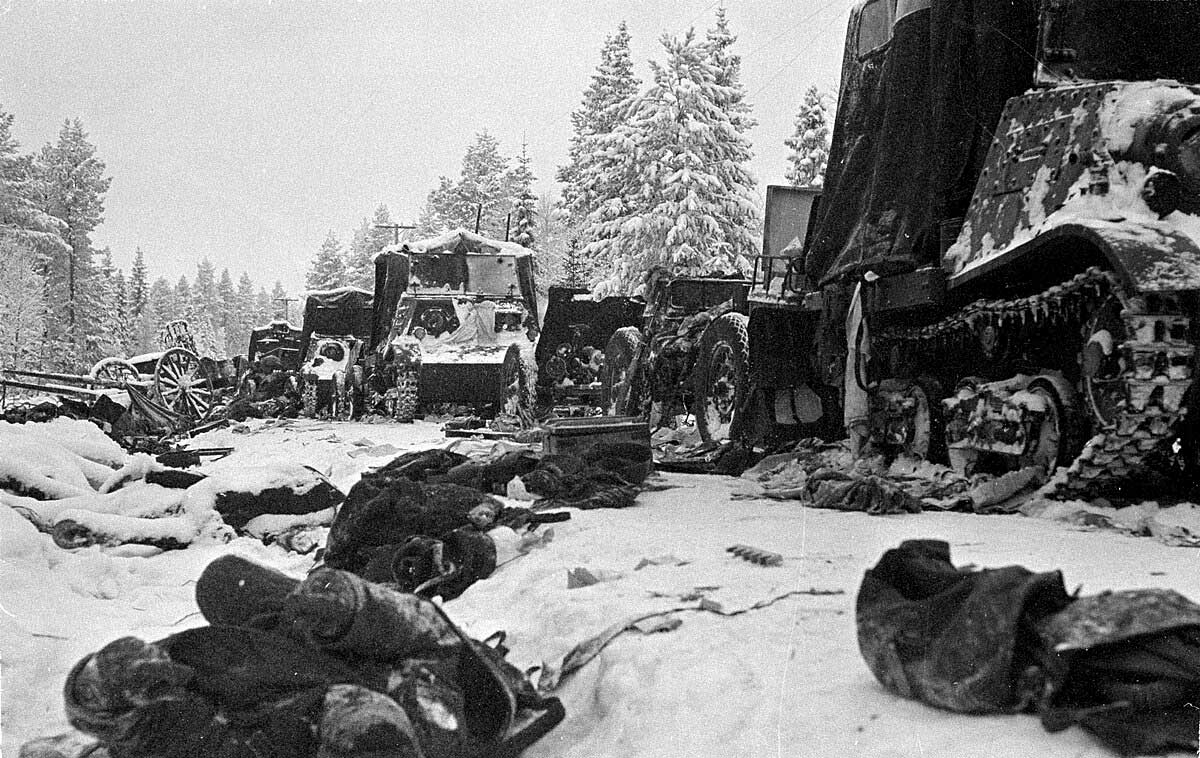 Eight and a half decades ago, on December 1, 1939, Otto Wille (Wilhelmovich) Kuusinen found himself in Stalin's office. He was to play a rather theatrical role — to portray the head of the «people's», truly proletarian government of Finland, with which Stalin's USSR could conclude a friendship treaty. The new government was to be temporarily located in the resort town of Terijoki (now Zelenogorsk) — Stalin and Molotov had put an end to the existing government of the neighbor, which did not cede the required territories to the Soviet Union. After staging the shelling of Soviet territory from Finland, organized by the chief Leningrad Chekist Sergey Goglidze, Soviet troops invaded the republic, and the bombing of Helsinki began.
Eight and a half decades ago, on December 1, 1939, Otto Wille (Wilhelmovich) Kuusinen found himself in Stalin's office. He was to play a rather theatrical role — to portray the head of the «people's», truly proletarian government of Finland, with which Stalin's USSR could conclude a friendship treaty. The new government was to be temporarily located in the resort town of Terijoki (now Zelenogorsk) — Stalin and Molotov had put an end to the existing government of the neighbor, which did not cede the required territories to the Soviet Union. After staging the shelling of Soviet territory from Finland, organized by the chief Leningrad Chekist Sergey Goglidze, Soviet troops invaded the republic, and the bombing of Helsinki began.
According to Molotov's logic, which he outlined a month before the invasion to the ambassador in Sweden and intermediary in many informal negotiations Alexandra Kollontai, Soviet troops were supposed to occupy Helsinki in «three days». In January 1940, after failing to do so in «three days», and even in several days by his 60th birthday in December 1939, Stalin reasoned: «We do not want the territory of Finland», we just need to make it a «friendly state». Soviet workers and military personnel were told that this was a liberation campaign — liberating from the «fascist militarist clique» of the white Finnish government, under whose oppression the Finnish people suffered. In turn, the Finnish people were supposed to meet Soviet troops with flowers — this was believed, for example, by the head of the political department of the Red Army Lev Mekhlis.
What Otto Wille thought about Stalin's plan is hard to say. Kuusinen was a very controversial figure, often wavering with the party line, and his personal experience of a communist coup in Finland was unsuccessful, he probably had no illusions about the Finnish proletariat enthusiastically accepting their «liberation». But where could he go — almost all the leadership of the Finnish proletariat was either in prisons or in graves, Otto Wille's second wife was firmly sitting in Stalin's camps, as was his son Esa. Stalin likely encouraged the father by releasing the son in that very 1939. Due to the shortage of national cadres, he even had to be included in the «people's» government.
The new post for Kuusinen was so humiliating that he came to hate Stalin, and during the Khrushchev thaw, he actively participated in exposing the cult of personality, and at the famous Plenum of 1957, when the old guard tried to remove the first secretary, he firmly defended Nikita Khrushchev, for which he received the position of secretary of the Central Committee. Historical mythology attributes to him the patronage of Yuri Andropov, in any case, the future chairman of the KGB told Georgy Arbatov that Kuusinen, being the chairman of the Supreme Council of the Karelo-Finnish SSR, saved him from serious troubles during the «Leningrad affair». Our national-patriots for this reason count him among the political «grandfathers» of Mikhail Gorbachev, and therefore, in the collapse of the USSR...
However, if we return to the cold December of thirty-nine, we can find such a scene. In Terijoki, for some reason, a correspondent of «Gudok» went, he did not find the government, which he reported to the editorial office, which, of course, became known to the competent authorities. Needless to say, the fate of this «cheerful reporter» has been unknown since then.
So, the demand for the territories of a neighboring country (the Finns did not know that the secret protocols of the Molotov-Ribbentrop Pact assigned them to Stalin's «sphere of influence») after the failure of the process, which would later be called «Finlandization», that is, the strengthening of the influence of a neighboring large country on a small country while formally maintaining its sovereignty. Stalin's intentions were well understood by the negotiator from the Finnish side in the summer of 1939, in 1940—1941 — the ambassador of Finland in Moscow, and after the war — Prime Minister and President Juho Kusti Paasikivi: «Russia wants to turn us, similar to Estonia and Latvia, into something like vassal states».
Invasion under a staged pretext. PR support in the form of a key thesis about the liberation of a brotherly people (as in the autumn of the same year it was done with Western Ukraine and Western Belarus, detached from Poland). As part of the PR plan, a song by the Pokrass brothers and the cynical but very talented rhymester Anatoly D'Actil-Frenkel appeared:
«...Much lies have been spun in these years,
To confuse the Finnish people.
Now open to us trustingly
The halves of wide gates!
Neither jesters nor scribes
Will disturb your hearts anymore.
Your homeland was taken away more than once —
We come to return it...»
The idea of the campaign as a blitzkrieg («three days») with the simulation of cooperation with a puppet government. Already on December 1, Beria's order was issued to prepare for the arrival of 26.5 thousand Finnish prisoners of war, which meant complacent planning of a second Katyn, only now with the destruction of not Polish, but Finnish servicemen.
Erroneous perceptions of the mood in society: intelligence reported on the nuances in the maneuvers of politicians, but failed the «Finnish studies» — no one understood that for the Finnish proletarian, his country was more important than Marxism-Leninism, especially in Stalin's expansionist execution. Moreover, before the eyes of «Suomi-beauty» Estonia, Latvia, and Lithuania were gradually turning into Stalin's protectorates.
The Red Army encountered serious resistance. The whole world, including the «friendly» Hitler, saw that it was by no means all-powerful: already two weeks after the start of the invasion, the 163rd division lost a third of its personnel and was put to flight. The same fate befell the 44th division. Official estimates of the Red Army's losses in the Winter War — more than 126 thousand servicemen, a hundred thousand more than the Finnish army lost.

Defeated Soviet column in Finland, January 1, 1940. Photo: SA-KUVA-ARCHISTO
Why this slaughter was needed, so quickly ended by Stalin in March 1940, after he began to think about the cost of the war, remains unclear. The question «why?» was not asked by the mass of unfortunate Red Army soldiers, many of whom were captured or became deserters. But in the capitals, judging by the reports of the authorities, many representatives of the advanced public asked such questions. For example, one of the «Spartak» brothers Starostin — Alexander, who believed that «the Finns cannot threaten Leningrad» (in 1942 he, along with all his famous football brothers, would go through the stages and come out of the Gulag only after the death of the despot).
At that time, the Finns could not and did not intend to threaten Leningrad. With his actions, Stalin turned Finland into the USSR's fiercest enemy, and what happened during the Great Patriotic War was called by the Finns the «Continuation War». Doubts crept into the souls of people capable of conscientious and critical analysis. In 1943, Alexander Tvardovsky wrote an extremely emotional and bewildered poem «From a worn-out notebook...», recalling an unfortunate young Red Army soldier frozen in Finnish ice, and identifying himself with him:
«...As if it were me lying,
Frozen, small, killed
In that uncelebrated war,
Forgotten, small, I lie...»
«There was something that prevented me from wholeheartedly striving for this war of the Soviet Union with Finland as I strove, even rushed to get to Khalkhin Gol», — Konstantin Simonov recalled years later.
«The war unleashed by Stalin resulted in exactly what he tried to prevent, — writes historian Stephen Kotkin in his fundamental work «Stalin». — Nothing more clearly indicated the deterioration of the USSR's position than Finland, the war with which cost the Soviet Union so much blood, money, and reputational costs».
...Almost twenty years later, Otto Wilhelmovich Kuusinen invited a young publicist from the magazine «New Times» Georgy Arbatov to his apartment in the House on the Embankment and offered him to join a group of unorthodox intellectuals to work on an unorthodox textbook «Foundations of Marxism-Leninism» — it was after the XX Congress, a window of opportunity opened. The work took more than two years. Despite the trusting relationship, Otto Wille never talked about how he worked in the Terijoki government. Of course, it was one of the episodes of humiliation. In 1962, Kuusinen and Mikoyan were the two members of the presidium of the Central Committee who questioned the advisability of deploying missiles in Cuba. The would-be Finnish leader died shortly before Khrushchev's resignation. And so he lies in the necropolis by the Kremlin wall. Along with other dear comrades.
* Andrey Kolesnikov is considered a «foreign agent» by the Ministry of Justice of the Russian Federation.